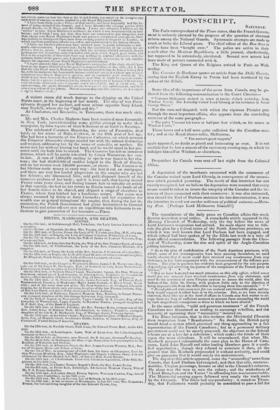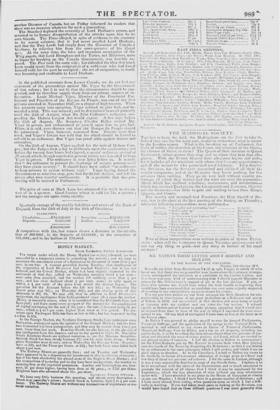The speculations of the daily press on Canadian affairs this
week deserve more than usual notice. A remarkable article appeared in the Morning C1/4ronick of Wednesday, only the day before the news of Lord Durhans's resignations had arrived. Its main object was to ridi- cule the plan for a federal union of the North American provinces, on which it was well known that Lord Durham bad been engaged, and which indeed bad been spoken of by the Globe last week in a tone of demi.official commendation. The following passages from the Chro- kicle of Wednesday, show the aim and spirit of the Anglo-Canadian jobbing interests.
" As to the plan of confederation of the North American provinces, with which sonic of our contemporaries have been amusing themselves, we need hardly observe that it never could have received any countenance from any sfistcs,utisuu in tie least acquainted with the circumstances of the different pro- since*. The plan in question has evidently been proposed for the sole purpose I(ligierbat.t.ei !Li ng %Id ad nout tin% the justice of the complaints of the French party at " But we have &stowed too much attention on this silly affair, which never could for one moment have received countenance from any statesman, and muss be the invention of sortie Utopian anxious to amuse the world, after the fashion of the Abbe St. Pierre,_ with projects liable only to the objection of being impracticable from the difficulties in carrying them into execution." * • "No enligAtened statesman ever for one moment entertained the plan, and no- body would suppott it either here or in the colonies. But, as we have already observed, those who are at the head of affairs in Canada may find matter to oc- cupy them ere long of sufficient moment to prevent them astounding the world by such magnificent conceptions as those to which we have alluded."
In the same article, "mild and generous treatment" of the French Canadians was denounced as tending to encourage rebellion, and the necessity of uprooting their "nationality " insisted on. The Times intimates, that in this instance the Alinisterial Chronicle drew inspiration from " Beauharnois." No doubt, the British party would dread it system which promised any thing approaching to a fair representation of the French Canadians; but as a permanent military government could not be openly proposed, the objectors to the federal scheme are at a loss for a substitute ; which makes the tirade of their organ the more ridiculous. It will be remembered, that when Mr. Roebuck proposed substantially the same plan in the House of Com- mons, Lord John Russell and other leading Members gave it a quali- fied approbation ; though they refused to entertain it then, on the ground that Mr. Roebuck propounded it without authority, and could give no guarantee that it would satisfy the malecontents.
The day after this article appeared, crime the "astounding" news from Canada, that Lord Durham bad resigned; and then that silly, unstates- manlike, Utopian personage, became an idol in the Chronicle's columns. He alone was the man to save the colony; and the wickedness of " Lord Brougham and the Tories" in affronting him was inconceivable. The Ministerial evening papers followed very uearly the track made by the Chronicle. The Globe had one peculiarity : it stated on Thurs- day, that Pediment would probably be assembled to pass a bill for
another Dictator of Canada, but on Friday informed its readers that there was no occasion whatever for such a proceeding.
The Standard deplored the necessity of Lord Durham's return, and reverted to its former disapprobation of the attacks upon him by its own friends. The Times alleged, in spite of evidence to the contrary in its recent columns, that it had never assailed Lord Durham ; and that the Tory Lords had simply done the Governor of Canada a kindness, by relieving him from the consequences of his illegal ac's. At the same time, the false and impudent assumption of the Whig papers, that Lord Brougham and the Tories, net Ministers, were to blame for breaking up the Canada Government, was forcibly ex- posed. The Post took the same side; but ridiculed the idea that much harm would result from the resignation of a nobleman who bad found himself unfit for the post he occupied : the act of resignation, in itself, was becoming and creditable to Lord Durham.



























 Previous page
Previous page